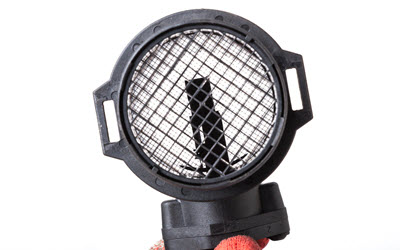MAF sensors are important components in a car’s engine. MAF is an acronym for Mass Air Flow, and the sensor is responsible for measuring the amount of air flowing into the engine. This information is then used by the engine computer to adjust the fuel mixture, ensuring that the engine runs at optimal levels.
MAF sensors can become dirty over time, which can lead to inaccurate readings and decreased performance. As a result, it is important to clean or replace MAF sensors as needed to keep your car running smoothly. Let’s look at the common warning signs of a problem and the causes so you can recognize them.
Signs of MAF Sensor Damage
The MAF sensor is a vital component of any vehicle’s engine, and it can fail without warning. However, there are usually some warning signs beforehand. If you notice any of the following four warning signs, it’s time to have your MAF sensor checked by a professional mechanic.
- One of the most common warning signs of an MAF sensor failure is an illuminated check engine light. This means that the engine’s computer has detected an issue with the MAF sensor.
- Another common sign is strange or erratic idling. If the MAF sensor isn’t working properly, it can cause the engine to idle erratically or even stall.
- Poor fuel economy is another symptom of a failing MAF sensor. If your vehicle suddenly starts consuming more fuel than usual, it could be due to a faulty MAF sensor.
- Finally, if you notice that your vehicle is less responsive than usual when accelerating, this could also be a sign that the MAF sensor is failing.
If you notice any of these four warning signs, don’t hesitate to have your MAF sensor checked by a professional mechanic.
What can cause an MAF sensor to fail?
Since MAF sensors are an essential part of a vehicle’s engine management system, their failure can have a major impact on engine performance. There are several common causes of MAF sensor failure, including:
- Road Debris Damage: One of the most common causes of MAF sensor failure is physical damage to the sensor itself. This can be caused by debris or other objects striking the sensor, or by extended exposure to high temperatures.
- Dirt and Grime: Contamination is another common cause of MAF sensor failure. Contaminants can build up on the sensing element, causing inaccurate readings.
- Electrical Issues: MAF sensors can also fail due to electrical problems, such as bad connections or voltage spikes. When troubleshooting MAF sensor problems, it’s important to consider all of these possible causes and bring your VW in for an inspection so we can find the root cause of the MAF sensor problem.
Hayes European: Your Local VW Specialists
MAF sensor failures are common in VWs as they age and endure wear and tear from the California roadways. As the MAF sensor is responsible  for measuring the amount of air that enters the engine, if it fails, the engine will not be able to run properly.
for measuring the amount of air that enters the engine, if it fails, the engine will not be able to run properly.
There are a few different ways to fix a MAF sensor failure, but the most common method is to simply replace the MAF sensor. This can be done by a mechanic, or in some cases, the MAF sensor can be replaced by the owner of the car. However, replacing the MAF sensor is not always necessary, as some MAF sensors can be repaired. If the MAF sensor is simply dirty, for example, it can be cleaned and reinstalled. In other cases, more drastic measures may be necessary, such as replacing the entire air intake system. But in most cases, simply replacing the MAF sensor is all that is needed to fix a MAF sensor failure. This is why it’s important to go to an auto shop you can trust.
Our team of skilled mechanics provides friendly service, short wait times, and low prices to vehicle owners in Santa Cruz and the surrounding areas or Santa Cruz, Aptos, Soquel, and Capitola, CA. If your European vehicle is in need of maintenance or repairs, you can trust Hayes European Automotive to handle the job right. Give us a call today!
 Mon-Fri: 8:00AM-5:30PM
Mon-Fri: 8:00AM-5:30PM 1125 17th Ave Santa Cruz, CA 95062
1125 17th Ave Santa Cruz, CA 95062
